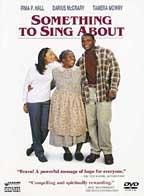 In case anybody’s wondering, I did watch some of the more recent Billy Graham movies this past week, but I don’t have a whole lot to say about them.
In case anybody’s wondering, I did watch some of the more recent Billy Graham movies this past week, but I don’t have a whole lot to say about them.
The Ride (1997) seems like an okay drama, but my appreciation for stories about friendships between grown-ups and children is outweighed by my lack of interest in westerns or movies about cowboys. A Vow to Cherish (1999) is a nice look at an adult Christian couple dealing with the onset of mental illness, etc.; but having the husband attend a Billy Graham crusade, just so that he will remember not to cheat on his wife, seems a bit contrived or gratuitous; and the subplot about the husband’s unsaved brother produces some truly cringeworthy dialogue. Road to Redemption (2001) is a valiant attempt at out-and-out comedy, even if it panders to certain stereotypes; though I’m not sure the yuks mesh all that well, stylistically, with the obligatory part of the film where the characters become convicted of their sin and ask Jesus into their hearts. Last Flight Out (2004) seems like it’s trying to be an adventure movie — it reminds me of everything from recent end-times films to Spire Comics’s old ‘The Brothers‘ stories — but it’s pretty tepid.
And then there is Something to Sing About (2000), which just might be my favorite of the bunch — thanks in part to the soulful gospel music and the presence of Irma P. Hall, best known these days perhaps for her role in the Coen brothers’ remake of The Ladykillers (2004), but also because this just may be the only Billy Graham movie in which a character comes to Christ after watching another Billy Graham movie! I think this may be the sort of thing for which the word “meta-textual” was coined.
FWIW, the only feature film from the past eight years that I didn’t see, because I didn’t have a copy, was The Climb (2002).
I am told that World Wide Pictures has no other films in the works right now, but if they did, I wonder how long we could go on calling them “Billy Graham movies”; a few of the more recent films have featured sermons and altar calls by Franklin Graham — who, BTW, doesn’t exactly have his father’s stage or screen presence.











